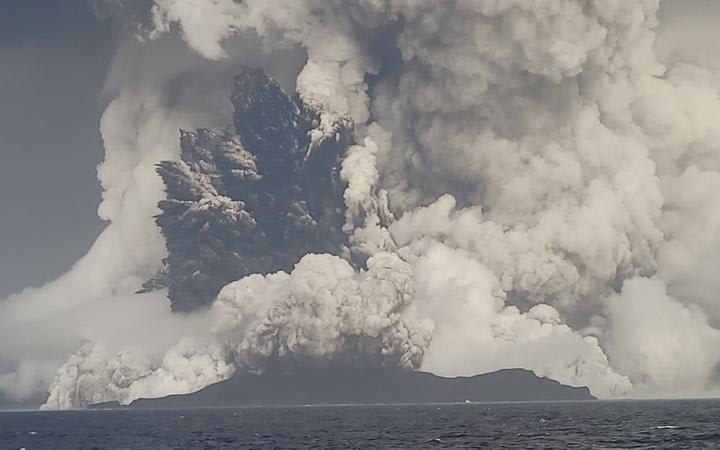
*This story was first published on RNZ and is republished with permission*
There has been little contact with Tonga since an underwater volcano erupted early yesterday evening, causing tidal waves to crash onto the islands and ash spewing into the air.
A tsunami hit the Kingdom after the Hunga-Tonga-Hunga-Ha'apai volcano erupted for eight minutes, throwing clouds of ash into the sky.
Waves flooded the capital, Nuku'alofa, where video footage showed water engulfing buildings.
Communications with Tonga has been down since 6.30pm yesterday, with reports that power had been cut in the capital.
Tongan authorities should have a clearer picture this morning of the scale of the damage from Saturday's volcanic eruption and tsunami.
Breaking: A tsunami warning is in effect for the island of Tonga after a volcanic eruption. A video shows a possible tsunami wave hitting the island. pic.twitter.com/rCarK7ShD8
— PM Breaking News (@PMBreakingNews) January 15, 2022
The New Zealand defence force is currently monitoring the situation in Tonga, and said it stands ready to assist if requested by the Tongan Government.
One-in-1000-year event, according to volcanologist
Scientists are predicting that Tonga's main island, Tongatapu, could be blanketed in ash this morning.
An Auckland University volcanologist, Shane Cronin, said the magma type erupted by Hunga-Tonga-Hunga-Ha'apai is called an 'intermediate composition' - similar to what comes from the Ruapehu volcano.
It was not especially rich in volatiles such as sulphur or fluorine, and as a result, this volcanic ash was not especially toxic.
However, he said, all volcanic ash could produce acid rain.
"Help will be needed to restore drinking water supplies."
Otago University geologist Marco Brenna estimated that Tonga's main island, Tongatapu, will be blanketed with a few millimetres to a few centimetres of ash today.
Cronin said the Hunga eruption was a one-in-1000-year event.
Radiocarbon dating suggested one major eruption of this scale occurred about AD1100 and another in AD200, he said.
"This, along with other data from the volcanic ash records, suggests a recurrence interval of 900 to 1000 years for very large eruptions at the volcano.
"The current eruption seems to be one of these large events which fits with the timing since the last of these in [circa] AD1100."
People were being urged to stay away from beaches and shore areas in north and east coast of the North Island and the Chatham Islands after the explosion yesterday.
A tsunami warning was issued for the whole of Tonga just after 5.30pm by the Tonga Meteorological Services.
The eruption, between 5:20pm and 5:28pm, caused windows to rattle, houses to shake and ash was in the wind.

Tidal waves crossed the Nuku'alofa shoreline and coastal roads and flooded properties.
RNZ Pacific's Moera Tuilaepa-Taylor said the volcano had semi-active but not spewing as much ash.
"Obviously things changed quite quickly."
Around 5.30pm people were posting to Facebook that sirens were ringing out across the capital, Nuka'alofa, and police were warning people to move to higher ground or stay in their houses. The geological service told people to wear masks because there was ash in the air and not long after that waves started hitting Nuka-alofa.
She said the volcano is about 65km from the main island of Tongatapu.
Visible satellite imagery - close up over #Tonga. Absolutely enormous #eruption. pic.twitter.com/R6oVgtzTgg
— WeatherWatch.co.nz (@WeatherWatchNZ) January 15, 2022
It had a serious eruption on December 20 and has been active up to January 11. It then became very active again on Friday.
"Yesterday's eruption was seven times bigger than the one on 20 December," she said, citing information from the geological service.
She said families in New Zealand would be trying to ring their relatives back home in Tonga but communication was difficult.
Waves looked "pretty big" on footage she had seen on social media, she said.
Samoa is about a three-hour flight away and she wouldn't be surprised if it was also affected by the latest eruption.
She didn't expect New Zealand to be affected.







